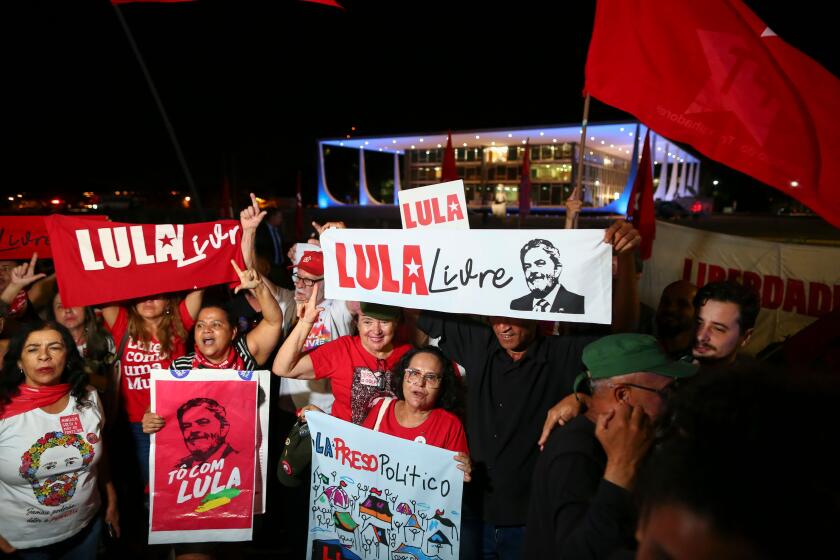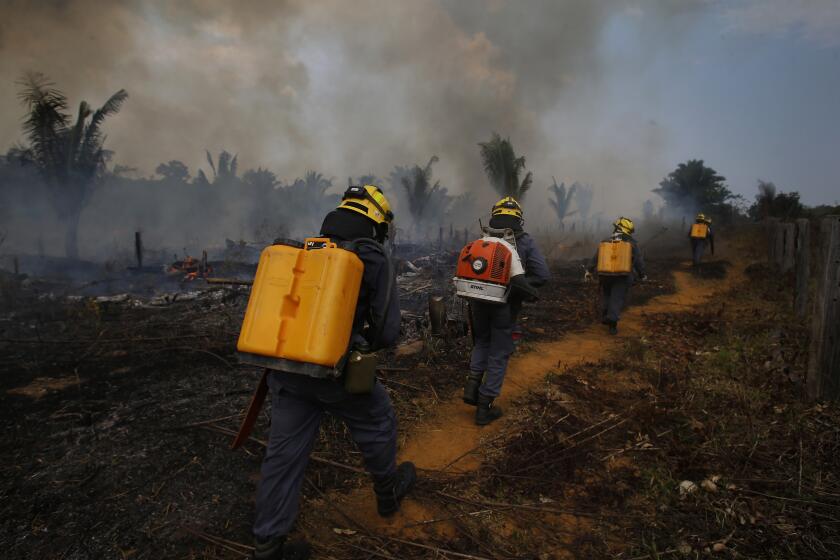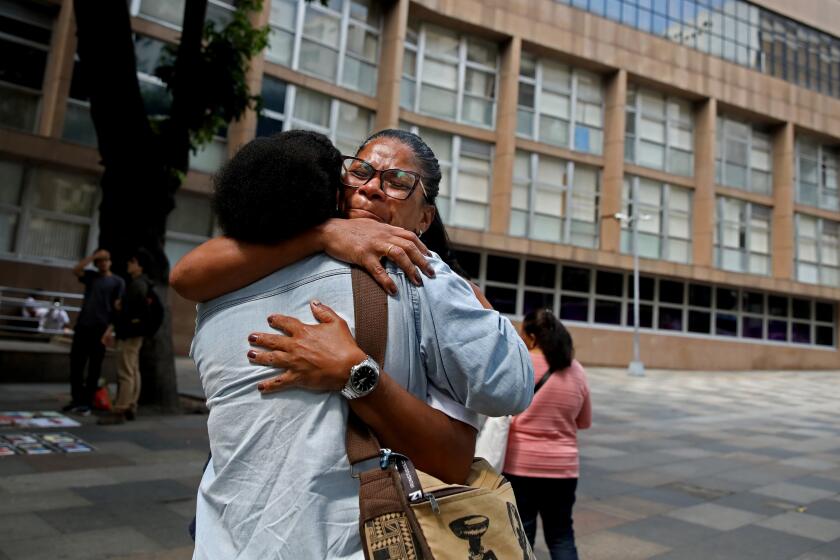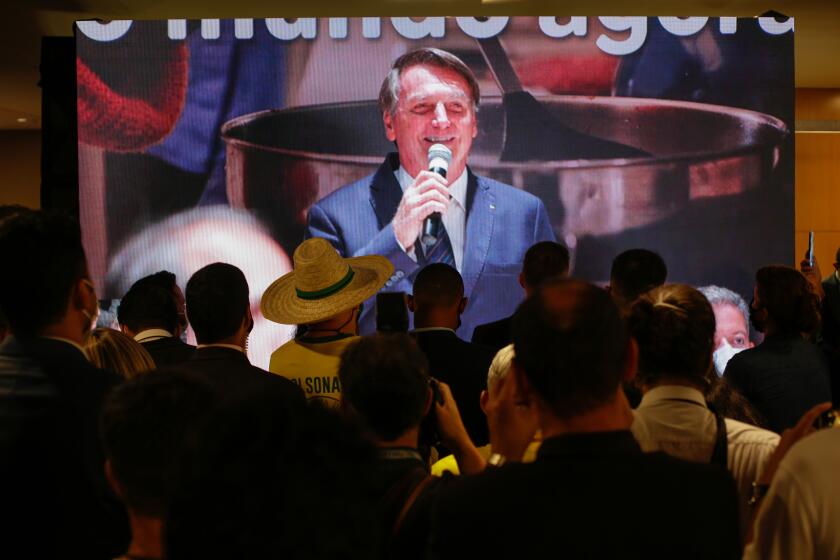Bolsonaro and the right outperform, pushing Brazil into a runoff ‘that will leave scars’

- Share via
RIO DE JANEIRO — Jair Bolsonaro and Luiz Inácio Lula da Silva, two diametrically opposed candidates for Brazil’s presidency, have started a four-week race to pursue votes ahead of a winner-take-all runoff.
After garnering more than 90% of the vote in Sunday’s first round, leaving their competitors far behind, incumbent President Bolsonaro and ex-President Da Silva, known as Lula, are already eyeing options that could push them over the top, whether political alliances or endorsements from candidates now eliminated.
Political analysts say Bolsonaro will seek to capitalize on an unexpectedly strong showing by the right wing as a whole to shore up support from politicians seeking advantageous alliances while Lula — who won the first-round vote — reaches out to moderates.
The election will determine whether a leftist returns to the helm of the world’s fourth-largest democracy or whether Bolsonaro can advance his far-right agenda for another term.
Many polls had indicated leftist Lula had a significant lead, with some suggesting he could even clinch a first-round victory. Most showed margins that neared or exceeded double digits. But Bolsonaro came within just 5 points of Lula, forcing an Oct. 30 runoff.
While Lula’s tally of 48.4% of the vote was within most polls’ margins of error, Bolsonaro’s 43.2% far exceeded most of them. The president’s allies running for Congress and governorships also outperformed polls.
“The far-right has shown great resilience in the presidential and in the state races,” said Carlos Melo, a political science professor at Insper University in Sao Paulo.
Luiz Inácio Lula da Silva was a wildly popular president in Brazil, then went to prison on corruption charges. Now he’s on the brink of an improbable comeback.
Speaking after the results were announced, Lula said he was excited to have a few more weeks of campaigning and the opportunity to go face-to-face with Bolsonaro and “make comparisons between the Brazil he built with the Brazil we built during our administrations.”
“I always thought that we were going to win these elections. And I tell you that we are going to win this election. This, for us, is just an extension,” Lula said.
Meanwhile, Bolsonaro seemed to appeal to poorer voters, who make up a significant chunk of Lula’s base. He highlighted high inflation that has boosted the cost of food and has hurt the approval ratings of leaders worldwide.
“I understand there is a desire from the population for change, but some changes can be for the worse,” he said. Bolsonaro added that he wanted to keep Brazil from adopting leftist economic policies that would put it on a troubled economic path similar to those of Argentina and Venezuela.
Despite the smoke clogging the air of entire Amazon cities, Brazilian state elections have largely ignored environmental issues.
It still isn’t clear why polls missed the mark on support for Bolsonaro and right-wing candidates.
Some analysts suggest voters had been embarrassed to tell pollsters they backed Bolsonaro and instead listed another candidate, said Arilton Freres, director of Curitiba-based Instituto Opiniao. “But that in itself doesn’t explain everything,” he added, saying outdated census data also may have had an impact on the design of the polls.
Bolsonaro and allies have repeatedly cast doubt on the polls, pointing instead to his street rallies with great turnouts. “Many people were carried away by the lies propagated by the research institutes,” Bolsonaro wrote Monday on his Twitter profile.
The right’s positive night extended to races for congressional seats and governorships, especially candidates with Bolsonaro’s blessing.
The steep rise in police violence has been celebrated by President Jair Bolsonaro, who has pushed for laws that would provide immunity for officers who commit homicide in the line of duty.
Bolsonaro said his party’s showing could bring fresh endorsements ahead of the runoff as other parties strike alliances in exchange for support. Bolsonaro’s Liberal Party will surpass Lula’s Workers’ Party to become the biggest in the Senate and the Lower House, with a total of 112 seats, or 23 more than its main rival — though still is short of what is needed to pass legislation by itself.
The right’s stronger-than-expected showing in Brazil’s populous southeast especially could benefit Bolsonaro, analysts say. His former infrastructure minister topped the race to govern Sao Paulo and will go to a runoff. The governor of Rio de Janeiro, an ally, won reelection outright, and the governor of the second most populous state, Minas Gerais, indicated in a video message Monday that he will endorse Bolsonaro.
Breaking News
Get breaking news, investigations, analysis and more signature journalism from the Los Angeles Times in your inbox.
You may occasionally receive promotional content from the Los Angeles Times.
Meanwhile, Lula’s campaign is likely to focus on winning over the centrist vote, especially in Brazil’s most populous state, Sao Paulo, where Lula’s politically moderate running mate, Geraldo Alckmin, is a former governor, independent political analyst Thomas Traumann said.
Bolsonaro has expressed no interest in bringing defeated presidential candidates to his side, while Lula has said he already reached out to competitors, who garnered about 8% of the vote combined. Analysts say there was a last-minute migration of votes from some of those candidates to Bolsonaro.
From soured friendships to Bannon advising the president, Brazil looks a lot like the Trump-era U.S.
Ten months before the next presidential election, Brazil is more polarized than at any point in recent memory.
“Brazil is much more polarized than many people thought, and governing will be difficult for whoever wins,” said Brian Winter, vice president for policy at the Americas Society/Council of the Americas. “I think the next few weeks will put heavy strain on Brazil’s democracy as these two men fight it out. Expect an ugly race that will leave scars.”
Simone Tebet and Ciro Gomes, the third- and fourth-place finishers, together earned 8.5 million votes. The difference between Bolsonaro and Lula in the first round amounted to 6.1 million votes, and more than 30 million people abstained.
Before the election, Tebet hinted she might urge her backers to vote for Lula and in televised debates, she vehemently criticized Bolsonaro’s four years in office. After results came out Sunday, she gave her coalition of political parties 48 hours to clarify who it will back, saying after that deadline she will make her own position public.
Center-left Gomes was a minister in Lula’s government before breaking with him, and in 2018 became openly hostile. That would make a possible endorsement more awkward, despite their ideological common ground, said Marco Antonio Teixeira, a public administration professor at the Getulio Vargas Foundation, a university in Sao Paulo.
“I want to make something clear: Lula is the favorite, period. As the momentum is Bolsonaro’s, people forget that,” Traumann said.
More to Read
Sign up for Essential California
The most important California stories and recommendations in your inbox every morning.
You may occasionally receive promotional content from the Los Angeles Times.
















